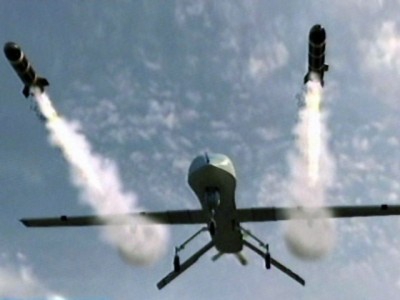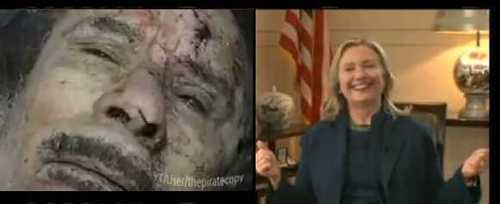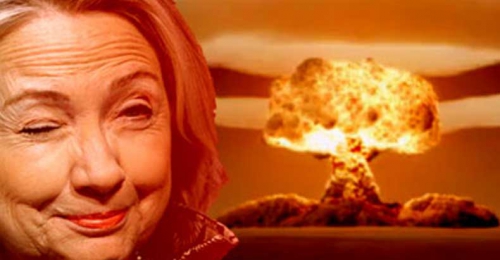We know quite a bit about Clinton and her foreign policy. What we know indicates that she is a warmonger and interventionist – as bad as any Republican ‘hawk’. I believe that her record on foreign policy should concern not just Americans but the world. A Clinton presidency is likely to lead to confrontations around the globe.
During her period in the Senate (2001-2008), she sat on the Armed Services Committee. The Village Voice dubbed her ‘Mama Warbucks’ in 2005. Clinton voted for war against Iraq and peddled the same lies as Tony Blair and his dodgy dossier. In a speech to the Senate in 2002 she said:
In the four years since the inspectors left, intelligence reports show that Saddam Hussein has worked to rebuild his chemical and biological weapons stock, his missile delivery capability, and his nuclear program. He has also given aid, comfort, and sanctuary to terrorists, including Al Qaeda members…
It was not until December 2006, as she began her first presidential campaign, that she changed her position by blaming her original viewpoint on bad intelligence during a spot on NBC’s Today programme. ‘If we knew then what we know now, I certainly wouldn’t have voted that way’, she said in reference to her initial support for the Iraq War.
When Clinton was US Secretary of State between 2009 and 2013, she showed the same eagerness for threatening or for the actual use of force. Anne-Marie Slaughter, Clinton’s Director of Policy Planning at the State Department, said of her, ‘When the choice is between action and inaction, and you’ve got risks in either direction, which you often do, she’d rather be caught trying.’ She is therefore an interventionist by nature.
To give you an understanding of what this interventionist instinct brings about, I want to look at some of the countries she has directed it toward and its consequences.
Honduras
In 2009, the State Department supported the CIA-backed coup against Honduras’ democratically elected President, Manuel Zelaya.
E-mails subsequently released from Clinton’s time as Secretary of State show that some of her top aides urged her to dub the putsch a military coup and to cut off US aid. She refused to do so. Instead, the US pushed for the world to recognise the coup’s new government.
In her memoir, Hard Choices, she described the events in Honduras as a ‘victory for democracy’.
The coup was followed by a wave of political violence which targeted a range of activists. Statistics from the United Nations Office on Drugs and Crime (UNODC) show that the murder rate increased from 60.8 per 100,000 in 2008 to 81.8 in 2010 following the coup, continuing to increase to 91.4 in 2011 and remaining high at 90.4 in 2012. Honduras is now a corrupt narco-state.
Kosovo
During the 1999 Kosovo War, in which Bill Clinton called in NATO to bomb Belgrade (resulting in 500 civilian deaths), Hillary, whilst traveling in Africa, telephoned her husband to offer him some advice. ‘I urged him to bomb’, she told reporter Lucinda Frank. As First Lady from January 1993, she encouraged her husband, and later also his Secretary of State, Madeleine Albright, to attack Serbian forces in the disintegrating Yugoslavia – not just in Bosnia in 1994 but also in Serbia in 1999.
When Hillary Clinton visited Pristina as Secretary of State, her support for Kosovo was clear: “For me, my family and my fellow Americans this is more than a foreign policy issue,” she affirmed. “It is personal.”
Whilst the case for some form of intervention in Kosovo is more hotly debated than those in other areas, the events which led to the recognition of the state by President George W Bush had unintended consequences. At the time, Russian President Putin said:
The precedent of Kosovo is a terrible precedent, which will de facto blow apart the whole system of international relations, developed not over decades, but over centuries. They have not thought through the results of what they are doing. At the end of the day it is a two-ended stick and the second end will come back and hit them in the face.
The Republic of Crimea proclaimed its independence from Ukraine on 11 March 2014, citing the Kosovo precedent.
Afghanistan
As Secretary of State, Hillary Clinton supported the ‘surge’ in Afghanistan: she supported sending a further 40,000 US troops there (on top of the 70,000 which were already present).
 Despite the high level of civilian casualties, Clinton has long been a strong supporter of drone strikes in Afghanistan and Pakistan. In an interview with The Guardian in July 2014, Clinton said:
Despite the high level of civilian casualties, Clinton has long been a strong supporter of drone strikes in Afghanistan and Pakistan. In an interview with The Guardian in July 2014, Clinton said:
Clearly, the efforts that were made by the United States, in cooperation with our allies in Afghanistan and certainly the Afghan government, to prevent the threat that was in Pakistan from crossing the border, killing Afghans, killing Americans, Brits and others, was aimed at targets that had been identified and were considered to be threats. The numbers about potential civilian casualties I take with a somewhat big grain of salt because there has been other studies which have proven there not to have been the number of civilian casualties. But also in comparison to what? The Pakistani armed services were always saying, ‘Well, let us bomb these places.’ That would have been far more devastating in terms of casualties. But of course anyone who is an innocent bystander, especially a child, who’s caught up in any operation against terrorists, that is a cause of great concern and it is a cause of real disappointment and regret on our part.
Armed conflict in Afghanistan continues. Afghanistan now produces around 90 per cent of the world’s heroin. The Taliban had banned the production of opium in 2000.
Syria
In 2011, as Arab regimes were overthrown in the so-called ‘Arab Spring’, Hillary’s State Department decided to withdraw diplomatic recognition of Syria. The US began to help the armed opposition, secretly at first. Although there was much talk of assisting a ‘moderate opposition’, it soon became clear that the ‘allies’ Clinton wanted to use to topple the secular Syrian regime were radical Islamists aligned with the al-Nusra Front, a branch of al-Qaeda. Yet, even now, Clinton defends US intervention in Syria, speaking of a ‘failure to help build up a credible fighting force of the people who were the originators of the protests against Assad – there were Islamists, there were secularists, there was everything in the middle – the failure to do that left a big vacuum, which the jihadists have now filled.’ Clinton expresses no regret over the civil war she helped start in Syria. Her only regret is that more arms and ammunition were not supplied to her favoured side. In recent debates, Clinton has advocated a no-fly zone over Syria: ‘ I am advocating the no-fly zone both because I think it would help us on the ground to protect Syrians; I’m also advocating it because it gives us some leverage in our conversations with Russia.’ The potential for conflict with Russia and Iran, both of whom are supporting the Syrian government, is both obvious and frightening.
The result of her policies toward Syria is that millions of Syrians have been displaced, and that refugees are drowning in the Mediterranean or else threatening the stability and identity of Greece, Turkey, and the European Union itself. Not to mention the fact that ISIS has a base in Syria from which to launch terrorist attacks across the world.
Libya
Clinton was an enthusiastic player in the destruction of the Libyan state by the US and NATO during 2011. Robert M Gates, the Secretary of Defense at the time, described President Obama’s decision to intervene as a ’51-49′ proposition, adding, ‘I’ve always thought that Hillary’s support for the broader mission in Libya put the president on the 51 side of the line for a more aggressive approach.’ It started with a ‘no-fly zone’, allegedly to protect civilians and dressed-up in all kinds of humanitarian language, and ended with a US-led bombing campaign which killed over 1,100 civilians. Her humanitarianism was absent in an interview with ABC’s Diane Sawyer. She was asked about the brutal murder of Col. Gadaffi by jihadists (after being sodomised with a knife on camera). Paraphrasing Julius Caesar, she said, ‘We came, we saw, he died!’ amidst much laughter and chuckling.

The result of her policies in Libya is that the country descended into civil war. Unsecured arms stashes in Libya soon spread west across the African Sahel and east to Syria. The Libyan catastrophe has led to war in Mali, made more weapons available to Boko Haram in Nigeria, and assisted ISIS in Syria and Iraq. One could also reference the persecution of Black Africans and Tuaregs within Libya and the emergence of Benghazi as a jihadist stronghold.
Clinton has continued to defend US intervention in Libya, claiming that the situation would have been worse without it: ‘We would be looking at something much more resembling Syria now.’
NATO
As Senator in 2008, Hillary co-sponsored 2008-SR439, which called to integrate Ukraine and Georgia into NATO. Whilst Clinton was Secretary of State, two more countries, Albania and Croatia, joined the US-dominated alliance. Many Russians believe they are now surrounded by an anti-Russian military alliance along their borders, stretching from the Baltic states in the north to Romania and Bulgaria. Clinton favours even further expansion.
Israel
As Secretary of State, Clinton oversaw the Obama Administration’s first attempt to broker an Israeli-Palestinian peace deal. She took a stance against Jewish settlements on land claimed by the Palestinians. However, in her memoir she noted that ‘[o]ur early hard line on settlements didn’t work.’
During her last year as Secretary of State, the Israeli newspaper Haaretz characterised her as ‘Israel’s new lawyer’ in response to her sympathetic view toward Binyamin Netanyahu’s 2014 bombardment of Gaza and his desire to maintain ‘security’ throughout the occupied West Bank.
More recently, Clinton drew applause for a speech to lobbyists for Israel when she declared,
The United States and Israel must be closer than ever, stronger than ever, and more determined than ever to overcome our common adversaries and advance our shared values. […] We will never allow Israel’s adversaries to think a wedge can be driven between us,” she said, explaining that when the U.S. and Israel have differences, she would work quickly to resolve them.
Clinton further added that America and Israel ‘must take our alliance to the next level’ through reaching a new 10-year memorandum of understanding on defence ‘as soon as possible’.
Iran
Clinton still publicly favours the Iran nuclear deal. In fact, she has claimed that it was her work to impose ‘crippling sanctions’ that forced Iran to the negotiating table. She said that the deal ‘put a lid’ on the Iranian nuclear programme by increasing Iran’s potential breakout time and creating new verification measures. Nevertheless, she said that the approach to Iran should be ‘distrust and verify’.
Her language toward Iran is bellicose:
This deal must come with vigorous enforcement…and a broader strategy to confront Iran’s aggression across the region,” said Clinton. “We cannot forget that Tehran’s fingerprints are on almost every conflict across the Middle East….There’s a big difference between talking about holding Tehran accountable and actually doing it…. The United States will act to stop [Iranian violations of the nuclear deal] and we will do so with force if necessary.
China
A Clinton presidency is a concern to China.
The State Department’s traditional stance was that ‘we take no position’ on the Sino-Japanese dispute concerning sovereignty over the Senkaku/Daioyutai islands in the East China Sea, which had been seized by Japan in 1895. As Secretary of State, Clinton departed from this by emphasising that the islands fall within the defence perimeter of the US-Japanese alliance.
In a 2011 interview, Clinton attacked China’s ‘deplorable’ human rights record, calling the government’s efforts to crack down on dissent ‘a fool’s errand’. China is wary of the way in which human rights issues are used tactically by the United States to sow dissent abroad and soften domestic public opinion for confrontation. No fools, those Chinese!
In 2010, she intervened in the South China Sea disputes at the ASEAN Regional Forum. Beginning by stating that Washington had no stake in the territorial disputes, she then laid out US interests in the South China Sea: ‘[A] national interest in freedom of navigation, open access to Asia’s maritime commons, and respect for international law in the South China Sea.’ Clinton further said that ‘legitimate claims to maritime space in the South China Sea should be derived solely from legitimate claims to land features’. China took this to mean that the US views the nine-dash line, which encircles almost all of the South China Sea, as not a ‘legitimate claim’.
China’s then-Foreign Minister, Yang Jiechi, walked out of the meeting. When he returned, he told the ASEAN members, ‘China is a big country and other countries are small countries, and that’s just a fact.’
China is deeply suspicious of Clinton and her views on rebalance which were set out in her 2011 Foreign Policy article, ‘America’s Pacific Century’. China views this as part of a strategy of containment.
The state-run China Daily commented regarding her departure as Secretary of State, ‘Clinton always spoke with a unipolar voice and never appeared interested in the answers she got.’
Conclusion
A brief look at the record and statements of Hillary Clinton shows how frightening the prospect of her becoming the American President is. Her confrontational instinct has led only to misery and death. We should all be very concerned about this woman gaining one of the most powerful positions in the world. My next article will explore whether Donald Trump is a better choice.





 del.icio.us
del.icio.us
 Digg
Digg